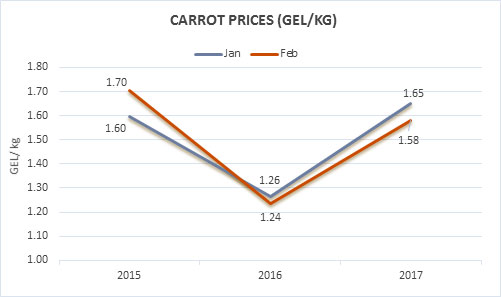According to the Retail FPI, by the end of February food prices had decreased slightly by 0.01% m/m (that is compared to the end of January), and by 2.6% y/y (that is compared to February 2016). Although overall FPI did not change very much either m/m or y/y, some foods experienced quite notable changes in prices. Thus cucumber, carrot, and tangerine prices increased by 25.7%, 9.8%, and 6.5%, respectively, whereas eggplant, vegetable oil, and tomato prices decreased by 41.7%, 5.8%, and 5.0%, respectively.
FLUCTUATIONS IN CARROT PRICES
In the last three years, carrot prices have presented quite an interesting trend. In 2015, they were relatively high, then decreased by 40% in 2016, and then increased again by almost 30% in 2017.

Such fluctuations (when price increases and decreases consecutively) might be explained by a concept called cobweb theory, an economic model which explains periodic fluctuations in prices in markets, where decisions about production amounts are made before prices are observed. Agricultural markets fall into this category because there is a time lag between planting and harvesting. According to this theory, producers' expectations about prices are assumed to be based on their observations of previous prices. The final outcome of the model might be either convergence to the stable equilibrium price and quantity, or divergence leading to even higher fluctuations in the future.
If this theory actually holds in the case of carrots, it means that carrot producers, who once observed high prices in 2015, decided to produce more in 2016 with an expectation of high prices and thus high profits in the next year. However, an increased supply in 2016 caused a decrease in prices, which demotivated producers and led to decreased supply in 2017. The shortage of carrots in 2017 led to high prices again. This trend is exactly in line with the cobweb model.
The main drawback of this model is that it assumes that producers are very shortsighted. If this is indeed the case, we hope that Georgian carrot producers learn from their mistakes, and engage in more long-term planning in the future.









